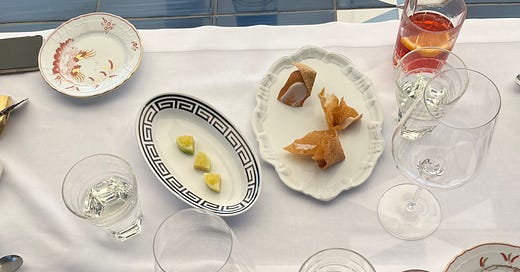Throughout the past decade and beyond, I have built my own gastronomic profile. Before that, I always took the chance to explore whatever I had in front of me, but in the last ten to fifteen years, I oriented my research alongside specific axes. I am interested in fine dining and everyday dining and how they dialogue with their territories. I am interested in service and the necessary centrality of the guest (not the chef) in hospitality.
I am ultimately interested in good food, which is the baseline and common ground for all gastronomers.
This has caused me to divert from the path of influencers or “foodies”: as I am just interested in excellence and good food, I don’t eat shit and say it’s hood against money and, above all, I don’t eat something to say “it’s the best xxx I’ve eaten in my life”.
Because my life is not over, I can not say that sentence. It's a bit like in the Simpsons meme.
What interests me the most in food is its immediate gastronomic aspects: its cultural connection, its political significance, its economic impact and status, and so on. I am a sociologist by education, and this was a deliberate choice I made early on: instead of “just” studying gastronomy (the University of Pollenzo had hope the year I entered higher education), I went on and studied sociology and political sciences, economics, management and international relations.
Only afterwards, I studied writing, and only afterwards, I studied communication - applied to gastronomy. This means that my gastronomic outlook will permanently be imbibed and infused by many other academic disciplines.
Looking at a plate, I don’t just see the culinary arts and craftsmanship. I see the labour and how politics influence the kitchen brigade’s work attitude or how subventions to agriculture bring or don't bring a certain product to my plate. I see the why and how, and behind a plate, there is so much more—apparently just ingredients. For me, everything is connected.
This is why I think writing a restaurant review is hard and almost impossible. I approach these tasks with a mix of academic pedantry and mixed techniques: I study every plate sociologically, economically, legally, anthropologically, and gastronomically and technically. It’s impossible to detach a plate from its socio-economical and cultural “table”, and every ingredient has its own story - not just its gastronomical one but also a deeper anthropological, cultural and economic meaning.
This is why sometimes I zone out.
This is also why I’m so uninterested in single visits, “recent openings,” “new projects,” and “unique events and experiences.” I’m a social scientist living in the skin of a gastronomer, and I can’t help myself.
I can only zip out my brain and take the hedonistic route. Only sparingly, though, and only in company, and only when I’m going to a familiar place to eat familiar food and I have a familiar chef as my counterpart.
This way, I have already done all possible analyses and thinking and need nothing more, nothing else, nothing at all, than a (preferably round) plate filled with food that I will like.






Hedonism is always there but understanding the root and why of a wine or a meal demands to analyse from social, political and anthropological angles. As with the language, understanding people is understanding their cook Thanks! I found your Substack by chance but I love your writing, A very interesting approach to gastronomy divulgation.
Interesting read, thank you! Especially after a great lunch in Lido84 :)